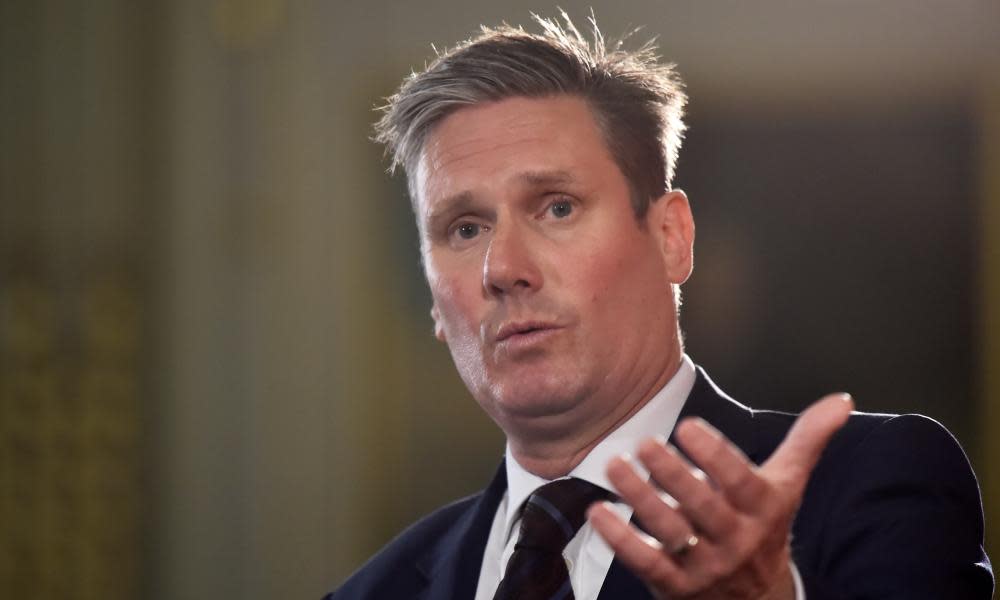Labour leadership agrees truce on immigration policy

Labour’s leadership has reached a truce over the party’s immigration policy ahead of the election, with an agreement that free movement of labour across the EU will have to end at the point of Brexit.
Jeremy Corbyn is understood to have signed up to the position along with other shadow cabinet members who have long been in favour of free movement, such as the shadow home secretary, Diane Abbott.
But while Corbyn has conceded the principle, there will still be a battle over the detail that will appear in the party’s manifesto.
Some senior figures are in favour of an extension of the points-based system that currently applies to people trying to enter the UK from Australia, Canada and other countries outside the EU.
Keir Starmer, the shadow Brexit secretary, on Tuesday floated the idea that Labour should emphasise free movement to work but not to claim benefits.
“Freedom of movement has to go and therefore it will have to change but we must have immigration that works for our communities and for our economy,” he said in a speech. “And that means there has to be movement of people to come and work in this country. How that’s managed will have to be resolved but the last thing we want is for our businesses to go bankrupt.”
The principles that have been agreed so far by Labour include reasonable management of migration, fair rules and more equality between the systems that apply to EU and non-EU citizens. Another key plank of Labour’s approach is that controlling immigration should not come at the expense of protecting the economy.
The issue of immigration has been extremely divisive for the party since the last general election, with Corbyn’s defence of free movement at odds with calls from some Labour MPs to listen to voters’ concerns about the numbers of arrivals.
Such are the sensitivities that immigration was not included in a general election script for Labour MPs, which reveals the party will direct its campaign focus to issues including schools, social care and the NHS.
Brexit is referenced in the document as MPs are told to emphasise that the election “is not a rerun of the EU referendum” and that the party only objects to the Tories’ “reckless approach to Brexit”.
Starmer set out the party’s broad EU policy, promising to prioritise the economy and set new negotiation aims, in a speech in Westminster a day after the former cabinet minister Peter Mandelson criticised Labour for lacking clarity on the UK’s planned withdrawal.
Starmer made clear Labour would not call a second referendum on EU membership, and he urged colleagues not to make it “look like we are trying to rub out the result”.
But this position was muddied by Paul Blomfield, a shadow Brexit minister, who suggested on Sky News that there could be scenarios in which the UK opted to stay in the EU.
When pressed, he replied: “Obviously if there were significant reforms that came out of these negotiations which addressed the concerns that led people to vote in the way they did last year, that’s a whole new ball game, isn’t it? But in the scenario we’re facing, we’re respecting the outcome of the referendum.”
Labour will turn its attention to the surer ground of health policy on Wednesday as Jonathan Ashworth, the party’s shadow health secretary, sets out three promises to NHS staff, including raising pay to a sustainable level that reflects the complexity of the work carried out, safe staffing levels put into law and better funding for training and education for NHS staff, including restoring nursing bursaries scrapped by the Conservatives.
Speaking at the Unison health conference in Liverpool, he will say: “NHS staff have been taken for granted for too long by the Conservatives. Cuts to pay and training mean hardworking staff are being forced from NHS professions and young people are being put off before they have even started. Now Brexit threatens the ability of health employers to recruit from overseas.”
The manifesto will be agreed at a meeting of senior Labour figures on 11 May. Meanwhile, many at the top of the party are embroiled in a wrangle over which candidates will get safe seats.
A number of Corbyn loyalists are in the running for key constituencies vacated by retiring MPs, including Sam Tarry, a Momentum activist, and David Prescott, an aide to the leadership team, in Hull West. Katy Clark, a former MP and Corbyn’s political secretary, has also been tipped for a seat.
The trade unionist Stephanie Peacock, a former partner of Labour’s deputy leader, Tom Watson, will compete for the Barnsley East seat vacated by Michael Dugher.
In Lewisham there is expected to be a close contest between Ellie Reeves – former Labour NEC member, sister of Rachel Reeves, and spouse of the MP John Cryer – and Christian Wolmar, former Richmond Park candidate and transport campaigner. Ibrahim Dogus, founder of the British Kebab Awards, has also put his name forward for the south London seat.
Labour MPs have largely been presenting a united front behind Corbyn since the election was announced, apart from Barrow MP John Woodcock, who has said he could never vote for the leader to be prime minister.
But Roy Hattersley, the former deputy leader and Labour peer, broke ranks to tell Radio 4’s World At One there were between six and 10 current backbench MPs who could potentially lead the party, and “they ought to be speaking out” rather than allowing the focus to be on “policies which are divisive and doomed to failure”.
Lord Hattersley said Corbyn was “unsuited to be party leader by temperament, by training, by background and by ability.” He added: “The idea that Jeremy Corbyn speaks for the people is absolutely nonsense.”

 Yahoo News
Yahoo News 
